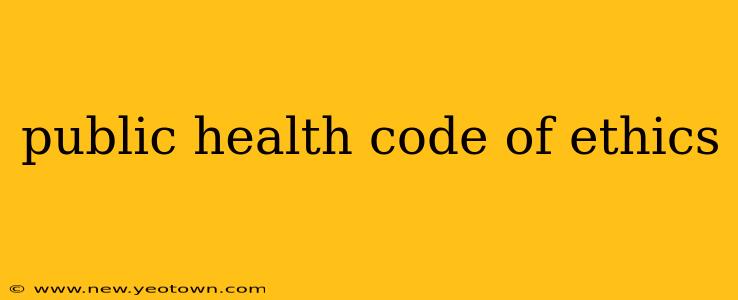The air hangs heavy with the weight of responsibility. A new virus emerges, a community grapples with a chronic disease crisis, a natural disaster unfolds. These are the scenarios where public health professionals step forward, guided by a powerful, yet often unspoken, force: the public health code of ethics. It's not just a list of rules; it's a living document, a moral compass navigating complex decisions with profound societal implications. This isn't just about preventing disease; it's about upholding the principles that underpin a just and healthy society.
This journey into the heart of the public health code of ethics will explore its core tenets, addressing the pressing questions that shape its practical application in the real world.
What are the core principles of the public health code of ethics?
The public health code of ethics isn't a single, universally adopted document like a legal code. Instead, it's a set of guiding principles developed and refined by organizations like the American Public Health Association (APHA). These principles consistently emphasize the following:
-
Social Justice: This is the cornerstone. Public health isn't just about treating individuals; it's about creating equitable systems that ensure everyone has access to health and well-being. This often necessitates addressing social determinants of health like poverty, discrimination, and environmental hazards.
-
Human Rights: Protecting and promoting human rights is paramount. Interventions must respect individual autonomy, dignity, and privacy, even when collective action is needed for the greater good. This includes navigating the ethical complexities of mandatory vaccinations or quarantine measures.
-
Collective Responsibility: This acknowledges that individual health is inextricably linked to the well-being of the community. It necessitates collaboration across sectors, engaging community members as partners in shaping health initiatives.
-
Evidence-Based Practice: Decisions should be grounded in the best available scientific evidence and data. Transparency and rigorous evaluation are vital for maintaining trust and accountability.
-
Transparency & Accountability: Open communication about risks, benefits, and limitations of interventions is crucial. Public health professionals must be accountable for their actions and decisions, subject to scrutiny and oversight.
What are the ethical challenges faced by public health professionals?
The reality of public health is far from textbook-perfect. Navigating ethical challenges is a daily occurrence:
Balancing Individual Rights and Collective Good: This is perhaps the most common dilemma. Measures to protect public health might infringe on individual liberties. For instance, mandatory quarantines restrict individual freedom, but are essential for containing outbreaks. Finding the balance requires careful consideration, communication, and often, difficult compromises.
Resource Allocation: Limited resources necessitate difficult choices about where to invest. Prioritizing one health program might mean neglecting another. Ethical considerations play a crucial role in determining how to allocate resources fairly and effectively.
Data Privacy & Confidentiality: Public health surveillance requires collecting and analyzing sensitive data. Protecting individual privacy while using data for population-level interventions is a delicate tightrope walk. Anonymization, data security, and robust regulatory frameworks are essential.
Cultural Competency: Public health interventions must be culturally sensitive and appropriate. Ignoring cultural nuances can undermine trust and hinder the effectiveness of programs. Building relationships with diverse communities is crucial for successful interventions.
Conflicts of Interest: Public health professionals might face pressure from political entities, industry, or other stakeholders. Maintaining impartiality and ensuring decisions are based solely on public health needs requires strong ethical resolve.
How does the public health code of ethics guide decision-making?
The code of ethics serves as a framework for ethical reflection and decision-making. It's a tool for navigating complex situations, asking crucial questions:
- What are the potential benefits and harms of this intervention?
- How does this decision impact different groups within the population?
- Are all stakeholders involved in the decision-making process?
- Is the information being shared transparent and accessible?
- How can we ensure accountability and learn from our decisions?
By systematically considering these questions, public health professionals can make decisions that align with ethical principles, building trust and promoting public good.
What is the role of public participation in public health ethics?
Public participation isn't merely desirable; it's essential. Community involvement fosters trust, ensures that interventions are culturally appropriate, and contributes to more effective and equitable outcomes. Meaningful engagement includes:
- Community engagement: Involving community members in the planning and implementation of health initiatives.
- Transparency and communication: Openly sharing information about risks and benefits.
- Feedback mechanisms: Providing opportunities for community feedback and input.
The public health code of ethics isn't just a set of rules; it's a commitment to a healthier, more just future. It's a call to action, a guiding star in the often-turbulent landscape of public health challenges. By embracing its principles, public health professionals can fulfill their crucial role in protecting and improving the health of populations worldwide.

